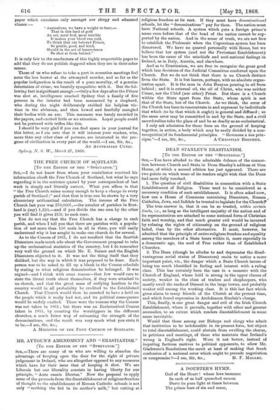DEAN STANLEY'S ERASTIANISM. [To THE EDITOR OF THE " SPECTATOR."]
Sin,—You have alluded to the admirable defence of the connec- tion between Church and State in Dean Stanley's address at Sion House, of which a second edition has just appeared. There are two points on which some of its readers might wish that the Dean had more fully touched.
1. The question of civil disabilities in connection with a State
Establishment of Religion. These used to be considered as a necessary condition of such establishment. It is often asked now, how can a House of Commons containing Dissenters, Roman Catholics, Jews, and Infidels be trusted to legislate for the Church'
The true answer is, that it can be so trusted, within certain limits, i.e., as long as the intelligent majority of the nation and of its representatives are attached to some national form of Christian faith and worship, and that much greater evil would be incurred by refusing the rights of citizenship on the ground of religious belief, than by the other alternative. It must, however, be admitted that the principle of entire religious freedom and equality among the members of a State bears within it, more especially in a democratic age, the seed of Free rather than of Established Churches.
2. The Dean (though he alludes to and deprecates the disad- vantageous social status of Dissenters) omits to notice a more important point, viz., the danger which a State Church incurs of being too much identified in feeling and interest with a ruling class. This has certainly been the case in a measure with the Church of England, whose hold is strong in the upper classes of society, weaker in the class of traders and shopkeepers, who mostly swell the ranks of Dissent in the large towns, and probably weaker still among the working class. It is this last fact which gives alarm to many friends of the Church at the present time, and which found expression in Archdeacon Sinclair's charge.
This, finally, is one great danger and evil of the Irish Church Establishment, where it prevails, together with other and greater anomalies, to an extent which renders disestablishment in some sense inevitable.
Would that those among our Bishops and clergy who admit that institution to be indefensible in its present form, but object to total disestablishment, could abstain from swelling the chorus, in petitions and meetings, of those who maintain that Ireland's wrong is England's right. Were it not better, instead of imputing factious motives to political opponents, to allow Mr. Gladstone's Resolutions the merit at least of making that frank confession of a national error which ought to precede negotiation
or compromise ?—I am, Sir, &c., H. F. MALLET.


































 Previous page
Previous page